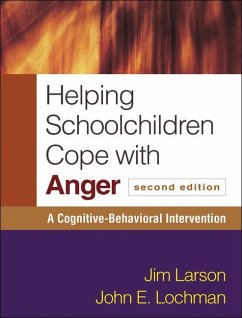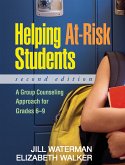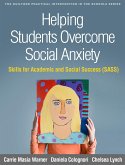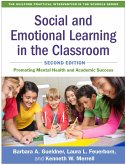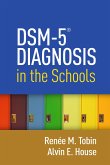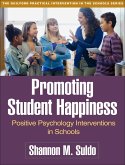- Broschiertes Buch
- Merkliste
- Auf die Merkliste
- Bewerten Bewerten
- Teilen
- Produkt teilen
- Produkterinnerung
- Produkterinnerung
This invaluable guide presents all of the information and clinical tools needed to implement the Anger Coping Program, an empirically supported intervention for students in grades 3&
Andere Kunden interessierten sich auch für
![Helping At-Risk Students Helping At-Risk Students]() Jill WatermanHelping At-Risk Students54,99 €
Jill WatermanHelping At-Risk Students54,99 €![Helping Students Overcome Social Anxiety Helping Students Overcome Social Anxiety]() Carrie Masia WarnerHelping Students Overcome Social Anxiety48,99 €
Carrie Masia WarnerHelping Students Overcome Social Anxiety48,99 €![Social and Emotional Learning in the Classroom Social and Emotional Learning in the Classroom]() Barbara A GueldnerSocial and Emotional Learning in the Classroom48,99 €
Barbara A GueldnerSocial and Emotional Learning in the Classroom48,99 €![The Helping Relationship The Helping Relationship]() The Helping Relationship37,99 €
The Helping Relationship37,99 €![Group Work in Schools Group Work in Schools]() Group Work in Schools90,99 €
Group Work in Schools90,99 €![Dsm-5(r) Diagnosis in the Schools Dsm-5(r) Diagnosis in the Schools]() Renée M TobinDsm-5(r) Diagnosis in the Schools43,99 €
Renée M TobinDsm-5(r) Diagnosis in the Schools43,99 €![Promoting Student Happiness Promoting Student Happiness]() Shannon M SuldoPromoting Student Happiness48,99 €
Shannon M SuldoPromoting Student Happiness48,99 €-
-
-
This invaluable guide presents all of the information and clinical tools needed to implement the Anger Coping Program, an empirically supported intervention for students in grades 3&
Hinweis: Dieser Artikel kann nur an eine deutsche Lieferadresse ausgeliefert werden.
Hinweis: Dieser Artikel kann nur an eine deutsche Lieferadresse ausgeliefert werden.
Produktdetails
- Produktdetails
- Verlag: Guilford Publications
- 2nd edition
- Seitenzahl: 222
- Erscheinungstermin: 19. Oktober 2010
- Englisch
- Abmessung: 262mm x 203mm x 15mm
- Gewicht: 499g
- ISBN-13: 9781606239735
- ISBN-10: 1606239732
- Artikelnr.: 29947089
- Herstellerkennzeichnung
- Produktsicherheitsverantwortliche/r
- Europaallee 1
- 36244 Bad Hersfeld
- gpsr@libri.de
- Verlag: Guilford Publications
- 2nd edition
- Seitenzahl: 222
- Erscheinungstermin: 19. Oktober 2010
- Englisch
- Abmessung: 262mm x 203mm x 15mm
- Gewicht: 499g
- ISBN-13: 9781606239735
- ISBN-10: 1606239732
- Artikelnr.: 29947089
- Herstellerkennzeichnung
- Produktsicherheitsverantwortliche/r
- Europaallee 1
- 36244 Bad Hersfeld
- gpsr@libri.de
Jim Larson, PhD, is Professor of Psychology and Director of the School Psychology Program at the University of Wisconsin-Whitewater. He is also a member of the Scientific Board of the Melissa Institute for Violence Prevention and Treatment, headquartered in Miami, Florida. Formerly a school psychologist with the Milwaukee Public Schools and the lead psychologist in the school system's Violence Prevention Program, Dr. Larson's major research interests are the treatment of anger and aggression in children and youth and programming for the prevention of school violence. John E. Lochman, PhD, ABPP, is Saxon Professor Emeritus in Psychology, Interim Director of the Alabama Life Research Institute, and Director Emeritus of the Center for Prevention of Youth Behavior Problems at the University of Alabama. He is also Adjunct Professor of Psychiatry and Behavioral Sciences at the Duke University Medical Center. A clinical psychologist, Dr. Lochman has authored more than 400 scientific articles, chapters, and books on the causes and consequences of highly aggressive behavior in childhood, and on the effects of intervention for this behavior. His current focus is research on dissemination, implementation, and adaptation of interventions. Dr. Lochman has served as Editor-in-Chief of the Journal of Abnormal Child Psychology and is a former President of the Society for Child and Family Policy and Practice (Division 37 of the American Psychological Association) and the American Board of Clinical Child and Adolescent Psychology. He is a recipient of the Distinguished Career Award from the Society of Clinical Child and Adolescent Psychology (Division 53 of the American Psychological Association).
1. The Development of Aggression 2. The Empirical Foundation for a
Developmental Model of Aggressive Children's Social-Cognitive and Emotional
Difficulties 3. The Role of Anger Management Training in a Comprehensive
School Program of Positive Behavioral Supports 4. Getting Started with the
Anger Coping Program: Group Leaders, Screening, and Identification 5.
Generalization and the Role of the Classroom Teacher 6. Preparing for the
First Meeting: Procedures to Implement and Pitfalls to Avoid 7. Outcome
Research Results for the Anger Coping Program and the Coping Power Program
8. The Anger Coping Program Manual 9. Considerations When Treating Girls
and Treating Children from Diverse Cultural Backgrounds 10. Possible
Negative Group Effects and Alternative Use as an Individual Format 11. Case
Example 12. Frequently Asked Questions 13. Afterword Appendices: A. Anger
Coping Program Teacher Nomination Form B. Anger Coping Program Teacher
Screening Scale C. Classroom Goals Interview D. Anger Coping Agreement E.
Anger Coping Program Classroom Generalization Inservice Guide F. My Goal
Sheet G. Goal Attainment Scaling Form H. Sample Parental Consent Letter
I. Anger Coping Program Initial Checklist
J. Hassle Log K. Anger Coping Program Parent Letters L. Sample Parental
Consent Letter and Anger Coping Program Parent Letters-Spanish Versions M.
Anger Coping Program Classroom Progress Monitoring Report (CPMR) N. Anger
Coping Program Intervention Integrity Checklists O. Stimulus Pictures
Recommended Further Reading
Developmental Model of Aggressive Children's Social-Cognitive and Emotional
Difficulties 3. The Role of Anger Management Training in a Comprehensive
School Program of Positive Behavioral Supports 4. Getting Started with the
Anger Coping Program: Group Leaders, Screening, and Identification 5.
Generalization and the Role of the Classroom Teacher 6. Preparing for the
First Meeting: Procedures to Implement and Pitfalls to Avoid 7. Outcome
Research Results for the Anger Coping Program and the Coping Power Program
8. The Anger Coping Program Manual 9. Considerations When Treating Girls
and Treating Children from Diverse Cultural Backgrounds 10. Possible
Negative Group Effects and Alternative Use as an Individual Format 11. Case
Example 12. Frequently Asked Questions 13. Afterword Appendices: A. Anger
Coping Program Teacher Nomination Form B. Anger Coping Program Teacher
Screening Scale C. Classroom Goals Interview D. Anger Coping Agreement E.
Anger Coping Program Classroom Generalization Inservice Guide F. My Goal
Sheet G. Goal Attainment Scaling Form H. Sample Parental Consent Letter
I. Anger Coping Program Initial Checklist
J. Hassle Log K. Anger Coping Program Parent Letters L. Sample Parental
Consent Letter and Anger Coping Program Parent Letters-Spanish Versions M.
Anger Coping Program Classroom Progress Monitoring Report (CPMR) N. Anger
Coping Program Intervention Integrity Checklists O. Stimulus Pictures
Recommended Further Reading
1. The Development of Aggression 2. The Empirical Foundation for a
Developmental Model of Aggressive Children's Social-Cognitive and Emotional
Difficulties 3. The Role of Anger Management Training in a Comprehensive
School Program of Positive Behavioral Supports 4. Getting Started with the
Anger Coping Program: Group Leaders, Screening, and Identification 5.
Generalization and the Role of the Classroom Teacher 6. Preparing for the
First Meeting: Procedures to Implement and Pitfalls to Avoid 7. Outcome
Research Results for the Anger Coping Program and the Coping Power Program
8. The Anger Coping Program Manual 9. Considerations When Treating Girls
and Treating Children from Diverse Cultural Backgrounds 10. Possible
Negative Group Effects and Alternative Use as an Individual Format 11. Case
Example 12. Frequently Asked Questions 13. Afterword Appendices: A. Anger
Coping Program Teacher Nomination Form B. Anger Coping Program Teacher
Screening Scale C. Classroom Goals Interview D. Anger Coping Agreement E.
Anger Coping Program Classroom Generalization Inservice Guide F. My Goal
Sheet G. Goal Attainment Scaling Form H. Sample Parental Consent Letter
I. Anger Coping Program Initial Checklist
J. Hassle Log K. Anger Coping Program Parent Letters L. Sample Parental
Consent Letter and Anger Coping Program Parent Letters-Spanish Versions M.
Anger Coping Program Classroom Progress Monitoring Report (CPMR) N. Anger
Coping Program Intervention Integrity Checklists O. Stimulus Pictures
Recommended Further Reading
Developmental Model of Aggressive Children's Social-Cognitive and Emotional
Difficulties 3. The Role of Anger Management Training in a Comprehensive
School Program of Positive Behavioral Supports 4. Getting Started with the
Anger Coping Program: Group Leaders, Screening, and Identification 5.
Generalization and the Role of the Classroom Teacher 6. Preparing for the
First Meeting: Procedures to Implement and Pitfalls to Avoid 7. Outcome
Research Results for the Anger Coping Program and the Coping Power Program
8. The Anger Coping Program Manual 9. Considerations When Treating Girls
and Treating Children from Diverse Cultural Backgrounds 10. Possible
Negative Group Effects and Alternative Use as an Individual Format 11. Case
Example 12. Frequently Asked Questions 13. Afterword Appendices: A. Anger
Coping Program Teacher Nomination Form B. Anger Coping Program Teacher
Screening Scale C. Classroom Goals Interview D. Anger Coping Agreement E.
Anger Coping Program Classroom Generalization Inservice Guide F. My Goal
Sheet G. Goal Attainment Scaling Form H. Sample Parental Consent Letter
I. Anger Coping Program Initial Checklist
J. Hassle Log K. Anger Coping Program Parent Letters L. Sample Parental
Consent Letter and Anger Coping Program Parent Letters-Spanish Versions M.
Anger Coping Program Classroom Progress Monitoring Report (CPMR) N. Anger
Coping Program Intervention Integrity Checklists O. Stimulus Pictures
Recommended Further Reading

